Uganda flags off 35 field teams for landmark national HIV and NCD assessment
The primary objective of UPHIA 2025 is to gather up-to-date information on the progress and impact of Uganda's national HIV epidemic response efforts.

In a move to strengthen public health in Uganda, the Ministry of Health, in collaboration with Makerere University School of Public Health (MakSPH) and the Uganda Bureau of Statistics (UBOS), has officially flagged off 35 field teams to conduct the third round of the Uganda Population-Based HIV Impact Assessment (UPHIA) 2025. This comprehensive national survey aims to assess the current status of HIV and, for the first time, Non-Communicable Diseases (NCDs) among the Ugandan population.
The public is strongly urged to cooperate with the field teams and provide accurate information, which is crucial for the success of this vital assessment.
Uganda is one of five countries globally rolling out this third UPHIA round, building on the critical insights gained from previous surveys conducted in 2016 and 2020. The 2025 UPHIA was officially launched on May 29, 2025, by Health Minister Dr. Jane Ruth Aceng, alongside key partners including the U.S. government, represented by the U.S. Centers for Disease Control and Prevention.
The primary objective of UPHIA 2025 is to gather up-to-date information on the progress and impact of Uganda’s national HIV epidemic response efforts. This data is essential for guiding further interventions, identifying existing gaps, and ensuring that health policies are responsive to the nation’s evolving health challenges.
A significant new addition to this round of UPHIA is the assessment of the burden of Non-Communicable Diseases, specifically high blood pressure, high blood sugar, and obesity, both among the general population and people living with HIV.
“The last UPHIA revealed significant gaps in HIV case finding, particularly among men and youth, which have profoundly influenced our programming priorities over the past five years,” stated Health Minister Dr. Jane Ruth Aceng. She further emphasized that the inclusion of NCDs is critical: “This information is important for developing health policies that are responsive to the changing health challenges and strengthening the health system.”
Underscoring the enduring partnership and commitment, U.S. Ambassador to Uganda, William W. Popp, remarked at the launch, “This survey is important as we work together to continuously monitor progress to achieve a healthier, more prosperous, and more secure future where HIV is no longer a threat to Uganda, the United States, or the world.” Ambassador Popp also highlighted the U.S. government’s substantial contribution, revealing that approximately $500 million has been spent this year on health programs in Uganda, making it the largest single provider of health assistance to the nation.
The UPHIA 2025 survey employs a rigorous, voluntary, and randomly sampled methodology. It will involve approximately 15,000 participants aged 15 and above, selected from 6,685 households nationwide. Of these adult participants, 14,980 are expected to undergo blood draws and HIV testing to assess viral suppression and other key health indicators. Additionally, 1,300 children and adolescents aged 10 to 14 will be interviewed, though they will not undergo blood tests.
Prof. Rhoda Wanyenze, Dean of Makerere University School of Public Health, affirmed her institution’s readiness and expertise during the May launch: “This milestone builds on our previous experience with similar surveys including TB prevalence and family planning surveys, among others, and reflects our strong research capacity, not only in Uganda but across the African region. We embrace this responsibility with confidence and are committed to delivering high-quality data with the same rigor and integrity that have defined our many previous studies.”
The extensive training for the field teams, hosted by MakSPH, commenced on May 19, 2025. Dr. Patrick Twesigye, an AIDS Control Program Officer at the Ministry of Health, stressed the pivotal role of the assessment. “UPHIA is a very important exercise for the AIDS Control Program at the Ministry because it gives us the information we use to come up with a strategic direction for the AIDS interventions that we are implementing,” he explained.
In a landscape where global funding for HIV programs is reportedly dwindling and donor fatigue is a growing concern, the need for accurate and actionable data has never been more pressing. “We still have a significant number of new HIV infections, and as a program, we are deeply concerned,” Dr. Twesigye noted. He expressed optimism that “this round of UPHIA will give us some of the answers” needed to identify the challenges the country faces in achieving epidemic control.
Dr. Herbert Kiyingi, a Medical Epidemiologist and Head of Surveys and Surveillance Teams at the U.S. CDC, underscored the paramount importance of data quality. “Poor quality data is a waste of resources. It means we will not be able to use that data to do what we need it to do,” he cautioned. While acknowledging the time-bound nature of the survey, Dr. Kiyingi emphasized the critical need for research teams to conduct their work ethically and without compromising standards. “I pray that we are able to fit this into the limited time available while still maintaining the quality of the final survey output,” he added.
Experts highlight that this round of UPHIA is particularly unique as it is the first to be executed by local implementing partners, showcasing Uganda’s growing capacity in public health research and data collection. The introduction of new measurement indices to capture emerging health concerns, particularly the rising burden of Non-Communicable Diseases, further marks this assessment as a crucial step towards a more holistic understanding of Uganda’s health landscape.







